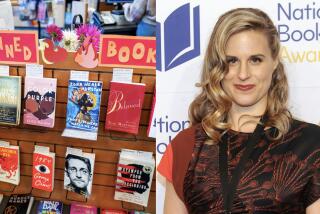Wild about ‘Harry’
- Share via
For the sake of English letters, J.K. Rowling should let go. Harry Potter has finished school and is out making his way in the world; it’s time for his progenitor to stop clinging. The phenomenally successful author is doing no favors to herself, her beloved creation or our culture by continuing to futz with the product and police her property against some of the muggles who made her rich.
For the sake of copyright, however, it’s probably necessary that Rowling pursue her suit against Michigan-based RDR Books, which is hoping to publish the “Harry Potter Lexicon.” Warner Bros. and Rowling are seeking to block publication of the book, a print version of the fan website hp-lexicon.org. The legal action is petty, churlish and, from a business standpoint, probably ill-advised. Nevertheless, it appears to be within bounds on both a narrowly legal and a broader moral basis.
Warner Bros. and Rowling charge that the proposed book version of the lexicon -- which the author tolerated and in fact praised when it existed in Web-only and mostly (but for a few ads) revenue-neutral form -- constitutes infringement of their copyrights on the “Potter” books and films. The plaintiffs’ complaint is written with the kind of breezy excitability we’re used to seeing in fan appreciations; we learn, for example, that “as has been widely publicized ... Rowling
None of these claims are conclusive. RDR’s lawyers, who include staff members at Stanford Law School’s public-domain-friendly Fair Use Project, note that the lexicon organizes Rowling’s material and makes it approachable in ways that, if anything, add value to the franchise. It’s also notable that the book version will dispense with the lengthy quotations, illustrations and screen shots that have been running on the website (without objection) for about seven years.
But does that mean Rowling doesn’t enjoy control over her own work? The most compelling public-interest argument against the steady expansion of copyright duration and power has been that it discourages new work by outsiders without encouraging copyright owners to be more productive -- as was clearly the case when, for example, Margaret Mitchell’s estate attempted to block “The Wind Done Gone,” Alice Randall’s parody of “Gone With the Wind.” That is not the case here. Rowling is still alive, still creating material and still in a position to want, and merit, relatively full powers over her invented universe.
That includes the power to devalue and ruin her own franchise. Young Harry has been with us for only about a decade, but he will grow old someday, and if you think wild contemporary popularity guarantees long-term literary reputation, look up the legacies of George Wilbur Peck or Maria Susanna Cummins. Authors may argue that their brands are diluted by unauthorized dictionaries, best-of lists and other fan-generated content (and really, shouldn’t Dumbledore have come out of the closet in a work of fan fiction rather than a Rowling press availability?), but these are essential to keeping the flame alive. The fans Rowling alienates today are people who won’t be around to lend their support when newer fads and fickle tastes entomb Harry Potter in the eternal remainder bin.
Having deftly (and mercifully) held to her pledge to cut off the series at seven increasingly bloated books, Rowling should move on, hope Warner’s movie adaptations can be completed before Daniel Radcliffe is ready for his old-age pension and continue to enjoy what most other writers would use the Avada Kedavra spell to get: readers willing to commit their lives to cataloging her stuff. If she doesn’t follow that course, however, that’s her right. Bad behavior should not mean that you lose your property rights, even if you’re a billionaire.
More to Read
Sign up for our Book Club newsletter
Get the latest news, events and more from the Los Angeles Times Book Club, and help us get L.A. reading and talking.
You may occasionally receive promotional content from the Los Angeles Times.






